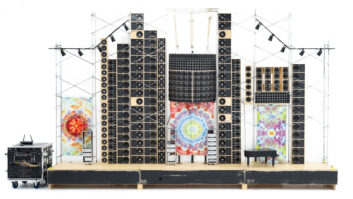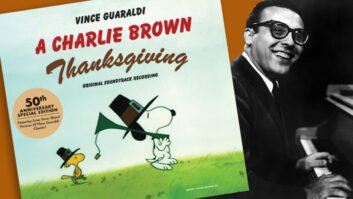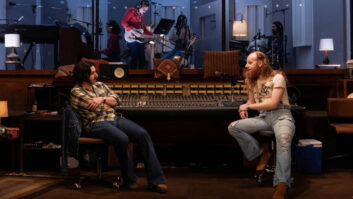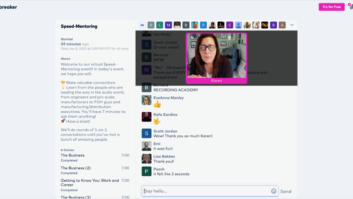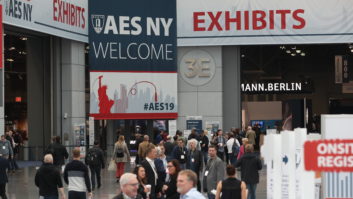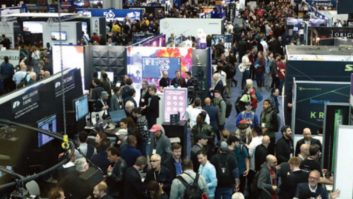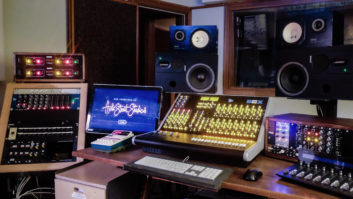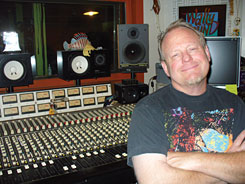
You’ve heard of the wall of sound? Well, this is the Wally Sound (www.wallysound.com). This project studio is owned and operated by musician/engineer Wally McClellan, who settled his business and his family in Oakland, Calif., 10 years ago. “I actually started my studio as a conduit for a lot of the musicians and bands I was working with in San Francisco,” McClellan says. “Studios in San Francisco at the time I started, in the early ’90s, were cost-prohibitive for a lot of people because there weren’t a lot of project studios. The 4-track revolution had taken off, but that was the only thing people had as far as home studios. I opened my studio with good gear in hopes that I could make product that was as good as the big studios for half the cost.”
Wally McClellan enjoys an eclectic mix of music and work.
Photo: Mavis McClellan
In those early days, McClellan’s studio, in the basement of his San Francisco rental, was consistently booked, catering to bands that were then considered up-and-coming in the San Francisco Bay Area: Spot 1019, Chuck Prophet, members of Camper Van Beethoven and others. When McClellan and his family were evicted from their S.F. home because the landlord wanted to sell the building, they saw it as an opportunity to grab some more livable space for themselves and the studio. “The people who had lived here before us were oil painters, and the whole first floor was a huge painting studio. It had 9-foot ceilings, and it was this big, wide-open space,” McClellan describes. “All I had to do was partition it off and build rooms within rooms, and soundproof it. I upgraded my equipment and had the chance to design a new studio.”
McClellan says he modeled his studio design after the original Motown Studios’ floor plan, but he soon learned that he’d have to rebuild more than the studio. His business changed quite a bit when some of the entrenched urban bands who he’d been working with either broke up or seemed to regard the East Bay — less than 10 miles away — as a distant land. Fortunately, McClellan’s music connections led him to other clients.
“Right before I got evicted from San Francisco, I’d been in a band called the Wellsprings of Hope,” he says. “I quit that band, and the bass player quit with me. His replacement was Alec Palao, who’d been in The Sneetches, and it turned out that Alec was [producing reissues] for Ace Records. He called me up and asked if I wanted to work on a Zombies box set. I said, ‘Of course!’ The project became Ace’s The Zombies: Zombie Heaven.
“It was my first experience doing reissue work and remixing for older-style music,” he continues. “He brought some multitracks over, and we started remixing a lot of the outtakes and alternative takes that The Zombies had done. I became completely fascinated with older-style technology and the great music that had been recorded in the late ’60s.”
McClellan has collaborated with Palao on a good number of Ace collections, including releases of The Golliwogs, Rick Nelson, Dan Hicks and a Creedence Clearwater Revival box licensed through Fantasy Records. And he’s developed a philosophical as well as a technical approach to this type of work. “A lot of times, when you use plug-ins to ‘fix’ things on these older releases — de-noise, de-click, de-hum — you can hear the effect of them after you start using them, especially in the high end,” he says. “The track sounded so good before, even though it had a hum in it or some kind of high-end distortion, but when you start to clean it up, you lose definition, you lose part of the spirit of the track. Usually, I’ll say that if it makes it sound better without making it sound different, I’ll do it. But if I start hearing that the sound is degrading and I’m not giving the listener the best possible sound without altering it, I’ll go back to the original.”
When McClellan began working on Ace projects, his studio was centered around a Soundcraft Series 2 board. Over the years, he has switched out and upgraded a lot of his equipment, including acquiring in 2005 a vintage 32-channel Auditronics 501 console once owned by Wally Heider and later modified by Dean Jensen. He also runs 32 channels of Pro Tools HD, complemented by an assortment of plug-ins, outboard gear, mics and instruments.
In addition to cultivating a relationship with Ace Records, he’s also developed a new East Bay client base. Recent projects include albums for Berkeley-based singer/songwriters Bart Davenport and Sean Smith, and the band Yard Sale, a collaboration of Melanie De Giovanni, Denise Funari and Jill Olson of Red Meat.
“I’ve been getting a lot of country-ish acoustic stuff recently,” McClellan says. “One night I’ll be doing a garage band, and the next a solo guitar record. I like it because I don’t feel that I want to stick with one particular genre. It keeps me on my toes.”
Barbara Schultz is a Mix assistant editor.
